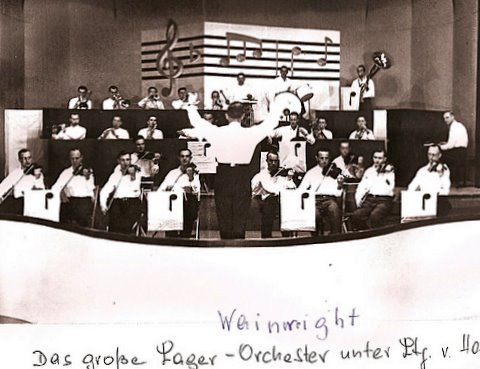
|
|
August 2010
Here is part 6 in our series of recollections by Canadian Lt. Leo L. Hamson, regarding his time as a guard at the Wainwright POW camp. (minor typos corrected) (The full set of Recollections is back online, with photos.)
Photo caption: "Das große Lager-Orchester unter Ltg. v. Ha" (?)
Making the Best of Lost YearsI spent no more time than I had to inside the stockade, being pre-occupied with concerns about my own future. As a result, I have few memories of the daily routines of the POWs. When we did go inside the wire, we left our weapons outside. I recall that many of the prisoners kept fit and occupied with sports, while others created handicrafts with amazing skill and ingenuity. Quite a number diligently studied a variety of university-level subjects in make-shift classrooms. In a large group of well-educated members of the Officer Corps, a significant number of former high school teachers and university professors could be found. Occasionally I would make brief visits to one of these classes and stand unobtrusively at the back of the room. Classes in English and mathematics were very popular. Once I noticed a teacher trying painfully to write on a blackboard with a tiny stub of chalk. On my next trip into town I stopped at a school and called on the principal. When I explained things to him, I had no difficulty obtaining a whole box of chalk packed in sawdust - a neat wooden box with a slide top. When I presented this to the struggling POW teacher, his eyes widened as though I had given him a box of gold. I remember one POW who had been an opera tenor. His barrack-mates objected and evicted him when he did his vocal exercises, running up and down the scale. He would stand alone at night in the farthest corner of the compound, his fine voice soaring in the darkness. I made a point of guessing when he would be out, so that I could go to the nearest guard tower to watch and listen to him as he broke into some romantic lieder. There was something unbearably poignant and heart-rending about his lonely performance, singing to the unheeding barbed wire fence in this wintry land so far, so very far, from his homeland. I wondered what operas he had performed, and in what grand opera houses across Europe. He had survived. But I thought of the countless others like him, our brightest and best in every field of endeavour, on both sides of this conflict, who could have done so much to advance our civilisation, but who perished in the furnace of war. Musical instruments and phonograph records were supplied by the YMCA and orchestras were formed. Sadly, I cannot recall hearing them perform. Likely I was always elsewhere on those occasions. Recently, in discussing this with Siegfried Osterwoldt, I learned that one POW had been the director of a school for symphony orchestra conductors in Germany. He quickly formed a 45-piece orchestra and drove them with military discipline as they performed Beethoven and Mozart with a high degree of excellence. That was in Camp 44 at Grande Ligne, Quebec, where Mr. Osterwoldt and many others were held before being moved to the newly-built camp at Wainwright. There was a good library, and some POWs became very proficient at repairing and re-binding books. Handicrafts were popular pastimes, and beautiful art-works in painting, sculpture and wood-carving were produced with amazing skill. They could make useful things out of almost any kind of scrap material. Others retreated to their quarters with text-books, diligently studying for some future profession when they were finally released into an uncertain world. Copyright 2004 by Leo Hamson; used with permission |

